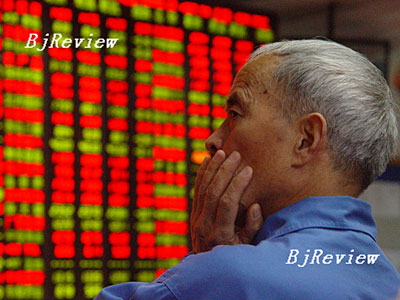|

In early 2007, spring chickens lined up to register for trading in the booming stock market. In the beginning of 2008, salespeople of securities companies spread their counters on street corners to market their companies to random passersby.
The U.S. subprime mortgage crisis swept the whole world and no countries were lucky enough to escape it.
The benchmark Shanghai Composite Index plunged 7.22 percent on January 22, the biggest drop so far this year, and devoured all the increases since August 2007.
On January 22, the Japan's Nikkei 225 closed down 5.7 percent, marking its lowest level since September 2005. Hong Kong shares were down 8 percent, while stocks in India plummeted so quickly that the Bombay Stock Exchange halted trading on the same day.
The mainland stock market is no longer immune to outside fluctuations. The largely expected global economic slowdown, especially the U.S. economic recession, demonstrated its strength in the emerging Chinese market, dragging it down 1,011 points or 18 percent in six trading days from January 15 to 22.
Chinese investors have felt increasing closeness to the global markets.
Hit by the U.S. crisis
Andy Xie, former Chief Economist of Morgan Stanley Asia, assumed that QDIIs (qualified domestic institutional investors) and QFIIs (qualified foreign institutional investors) were one of the major reasons why global stock market turmoil had affected China. "We opened two gateways for money to flow in and out, and they connected the formerly closed mainland market to the world," he said.
According to Xie, the American crisis caused a sharp plunge in the Hong Kong stock market, and many mainland companies are listed both on the mainland and in Hong Kong, "which had considerable impact on the mainland stock market."
When the U.S. subprime mortgage crisis pinched America and other developed countries starting from last August, investors across the Pacific Ocean felt lucky to escape from the global plague as the Chinese stock market picked up its bull momentum and surged almost 30 percent until mid-October.
However, along with the buoyant atmosphere, disasters followed. The major Chinese stock indexes plummeted one round after another. When news came that Citigroup Inc. lost $9.83 billion and Merrill Lynch slumped to its biggest loss of $10.3 billion in the fourth quarter of last year, the mainland stock market could no longer sustain itself, leading to the biggest drop of 7.22 percent so far this year. Chinese banks, especially Bank of China, were reportedly suffering from huge losses as they were involved in buying subprime mortgage-backed bonds.
Xie predicted that the subprime mortgage crisis might hit China even harder next year. "The stock market may still grow by inertia this year, but if the U.S. economy cannot recover from the crisis in 2009, it is without doubt the bull market will end," he said.
According to Xie, it is commonly acknowledged that a bull market usually lasts for three to four years and then problems will emerge. China might lag one year behind the global market. For instance, the Chinese stock market became bearish in 2001, while the international markets started in 2000. "The international stock markets have already entered a bearish period this year and this will probably last for two years," said Xie.
| 